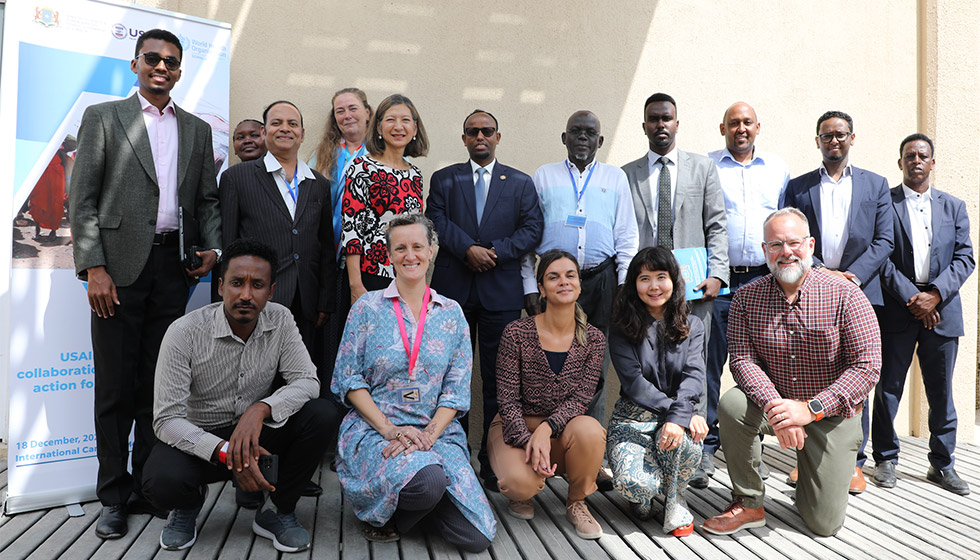 Participants from the Federal Ministry of Health, USAID/BHA and WHO Somalia pose for a group photo after a review meeting of the USAID-funded project in Mogadishu. Photo credit: WHO/Fouzia Bhatti
Participants from the Federal Ministry of Health, USAID/BHA and WHO Somalia pose for a group photo after a review meeting of the USAID-funded project in Mogadishu. Photo credit: WHO/Fouzia Bhatti
18 December 2023, Mogadishu, Somalia – The WHO country office for Somalia, along with the Federal Ministry of Health, and the United States Agency for International Development’s (USAID) Bureau of Humanitarian Assistance (BHA), convened a meeting to review the progress achieved through a collaborative project for scaling up the health response to drought in Somalia.
This project is being implemented by the Ministry of Health with the technical support of WHO Somalia and is being funded by USAID’s BHA with a US$ 2 million contribution. The project is instrumental in strengthening 2 critical areas of drought response: national and subnational health cluster coordination, and community-based surveillance. The new collaboration between BHA and WHO demonstrates a global commitment to humanitarian relief.
Five consecutive failed rainy seasons in the Horn of Africa since 2022 have led to an unprecedented drought crisis. In Somalia, the drought has affected 8.7 million people, with over 1.9 million displaced and 6.7 million facing critical health needs. In May 2022, WHO declared the drought a Grade 3 public health emergency, indicating the highest level of concern. In February 2023, Somalia’s Federal Ministry of Health, WHO, and the United Nations Children’s Fund (UNICEF) estimated that the drought in Somalia may have caused 43,000 excess deaths in 2022. Shockingly, children aged under 5 years may account for half of these deaths.
Dr Ali Hadji Adan Abubakar, Minister of Health and Human Services said “We express our gratitude to WHO and USAID for their continued support to our fragile health system. This project will help build on the great strides made during the COVID-19 pandemic to strengthen national and sub-national capacity to prepare for, respond to, and recover from public health crises.”
WHO Somalia is delivering a range of life-saving health and nutrition interventions in 28 Somali districts in response to the dire health needs arising from the drought. The activities target nearly 6 million people, including 2 million internally displaced people, and span the 5 strategic pillars of WHO’s Food Insecurity and Health Readiness and Response Strategic Framework: (1) coordination and collaboration; (2) surveillance and information; (3) outbreak prevention and response; (4) essential nutrition actions; and (5) essential health service actions.
BHA’s support comes at a critical time: more resources are urgently needed to bridge the resource gap for pillars 1 and 3 of the Framework and so continue the health emergency response. The project will help strengthen coordination, at the subnational level especially, through the recruitment and deployment of key roles at the state level. This will help decentralize the drought response, increase state-level capacity to manage crises and strengthen collaboration with other stakeholders, including the Ministry of Health, Health Cluster partners, and other clusters such as the Food Security, Nutrition, and WASH (water, sanitation, and hygiene) clusters.
BHA will also support WHO to deploy community health workers to conduct risk communication for disease prevention, and disease surveillance and alerts, to contribute to early detection and response to epidemics in communities. Such efforts can contribute to reducing excess deaths.
Dr Ireneaus Sebit Sindani, WHO Representative a.i. in Somalia, stressed the importance of the collaboration: “This new partnership with USAID’s Bureau for Humanitarian Assistance marks a significant stride in counteracting the devastating health impacts of Somalia’s protracted drought. WHO remains unwavering in its duty towards the people of Somalia and is working to strengthen coordination and disease surveillance. Our activities across the 5 strategic pillars of the Framework ensure a life-saving response in these critical times and conditions.
“The Somali drought crisis necessitates a unified, global response and we encourage other international entities, agencies, and governments to partake in similar efforts,” Dr Sindani added. “The gravity of this predicament sounds a call to action – to deliver aid to those most in need, and to strive towards a future where such extensive suffering is only a historical footnote.”
“USAID’s Bureau for Humanitarian Assistance is honoured to partner with the World Health Organization to address some of the devastating health impacts from climate-related challenges in Somalia,” said Ms. Sheri-Nouane Duncan-Jones, USAID Somalia Mission Director.
“This new project with WHO is critical to USAID’s humanitarian response and will allow Somali government partners to manage, monitor, and treat disease outbreaks, especially in communities suffering from multiple and complex crises,” she added. “By focusing on community-based initiatives, this critical project will also build a more resilient health system, better prepared for future health emergencies.”
For more information, please contact:
Danielle Botti, Senior Development Outreach Communications Specialist, USAID Somalia
Email:
Fouzia Bano, Communications Officer, WHO Somalia
Email:
Saeed Ahmed, Reporting Officer/EXR
Email:
Related links
For more details about WHO Somalia’s drought response and results in 2022, you can view: Drought report 2022: managing an unprecedented health crisis.


